Virchow Foundation
for Global Health
The Virchow Foundation’s Council is comprised of members with diverse expertise and competencies, across sectors – academia, civil society, politics, international organisations, private – and global representation. As part of its work, the Council may establish ad hoc or long-term committees and working groups for specific activities. A core task of the Council is to nominate and elect the members of the Virchow Prize Committee.
Members of the Council provide strategic guidance and advise on the direction towards realizing the Foundation’s purpose and mission as laid down in the Foundation Statutes. Council Members advise on how the Foundation and the Prize can contribute to SDG 3 and other health-related SDGs of the UN 2030 Agenda, and they represent, promote and support the Foundation and its goals within their own networks and in relevant meetings and events.
PROF. DR. JOANNE LIU
Council Chair
School of Population and Global Health (SPGH)
Faculty of Medicine and Health Sciences, McGill University
PROF. DR. HEIDI LARSON
Council Chair-Elect
Founding Director, The Vaccine Confidence Project
London School of Hygiene & Tropical Medicine
PROF. DR. TILL BÄRNIGHAUSEN
Director, Heidelberg Institute of Global Health
PROF. DAME SALLY DAVIES
UK Special Envoy on AMR
Department of Health and Social Care

Professor Dame Sally Davies is the Special Envoy on Antimicrobial Resistance for the United Kingdom. Prior to this role, Dame Sally was the Chief Medical Officer for England and Chief Medical Adviser to the UK government from March 2011 to September 2019, having held the post on an interim basis since June 2010. She shares her motivation for joining the Council and raising awareness for global health.
From your perspective, why is engagement and awareness raising for global health important?
We need the public to start driving action. On antimicrobial resistance (AMR), public engagement does not currently match the scale of the threat, and this will directly impact our ability to change behaviours and policies,. Everyone has a role – leadership can come from the top, as well as from grass-roots, so we need to work together.
How are you committed to engaging in global health topics within your current professional role and activities?
As UK Special Envoy on AMR, I engage bilaterally and multilaterally to raise awareness and drive action on AMR. In 2021, I advised the UK’s G7 Presidency to secure bold commitments on AMR, and I am now honoured to be a Member of the UN Global Leaders Group on AMR to accelerate action across all sectors. I co-lead the UK’s Investor Action on AMR initiative to galvanise the voices and influence of investors to support antibiotic sustainability. In my role as Master of Trinity College, I founded and launched The Trinity Challenge, a global initiative to use data to better respond to global health emergencies.
How do you hope to achieve greater awareness and engagement for global health in your new role at the Virchow Foundation for Global Health? How can the Virchow Prize for Global Health help to increase awareness?
I hope to collaborate with other members to share expertise and best practice, and inspire collaboration across sectors and countries on global health. Our collective network will hopefully be able to find new ways and new platforms of engaging; I also hope to inspire young people to follow in the footsteps of Virchow Prize winners.
PROF. DR. CHRISTIAN DROSTEN
Director, Institute of Virology
Charité – Universitätsmedizin Berlin
PROF. DR. VICTOR J. DZAU
President
U.S. National Academy of Medicine (NAM)
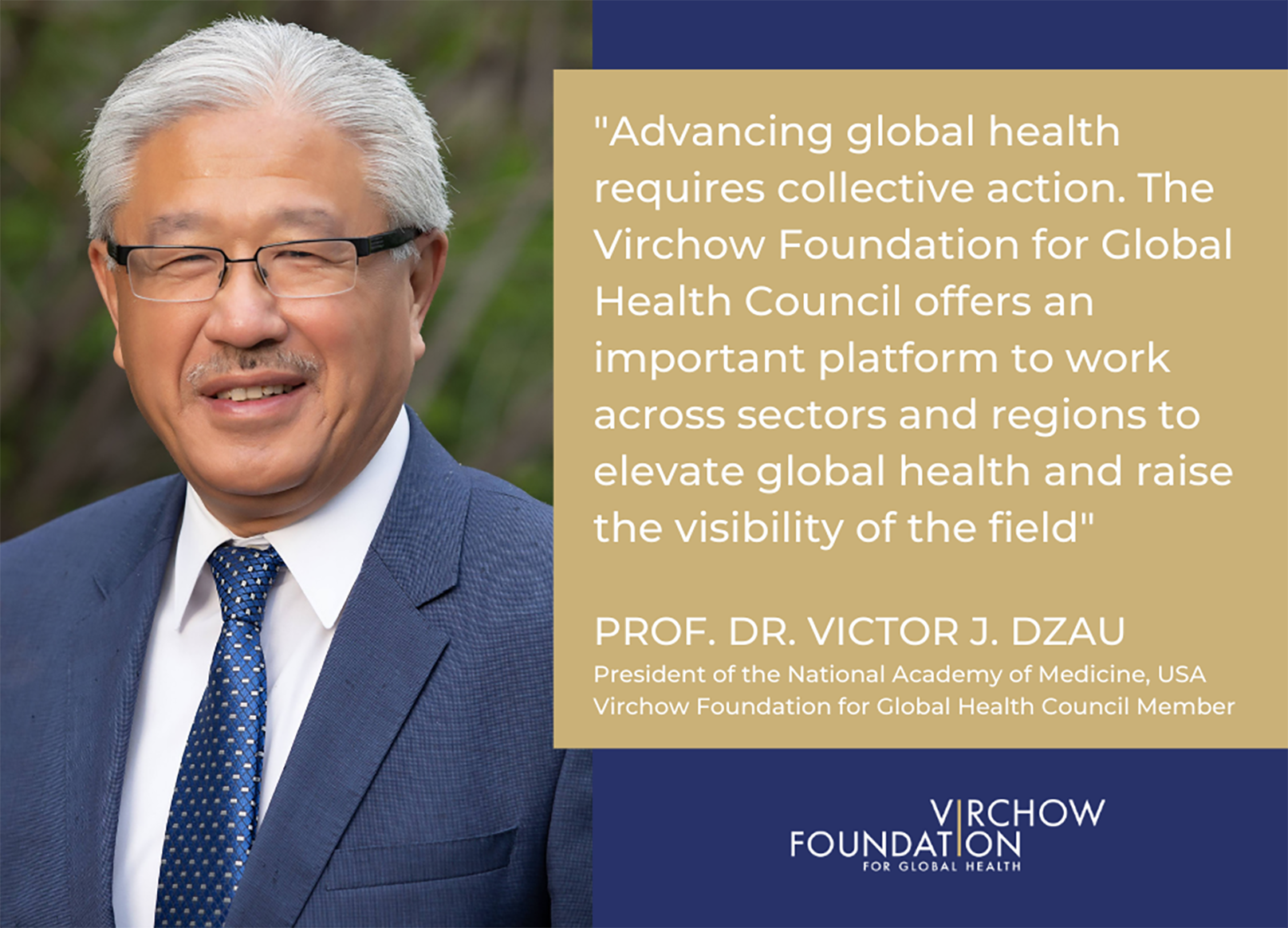
Victor J. Dzau, MD is the President of the National Academy of Medicine (NAM) in the United States. In addition, he serves as Vice Chair of the National Research Council. Dr Dzau is Chancellor Emeritus and James B. Duke Professor of Medicine at Duke University and the past President and CEO of the Duke University Health System. Previously, Dr Dzau was the Hersey Professor of Theory and Practice of Medicine and Chairman of Medicine at Harvard Medical School’s Brigham and Women’s Hospital (BWH), as well as Chairman of the Department of Medicine and Director of the Falk Cardiovascular Research Center at Stanford University. As a member of the Virchow Foundation for Global Health Council, Dr Dzau is motivated to help honour special achievements in global health towards elevating visibility of the field.
From your perspective, why is engagement and awareness raising for global health important?
Advancing global health requires collective action. Health threats, such as infectious disease crises, do not respect national borders. There is a need to respond effectively to global health threats – both urgent crises and ongoing health challenges. In addition, there is a rising challenge of increasing rates of NCDs and endemic infections (e.g., TB, HIV/AIDS).
Achieving global health and well-being is an important part of the United Nations Sustainable Development Goals (UN SDGs). Individuals and governments have an important role to play. Stakeholders and decision-makers must act to promote the common good and renew their commitment to multilateralism and the multilateral system. Community engagement and trust is vital. Citizens can protect one another and demonstrate social and moral responsibility by acting in the best interests of all.
How are you committed to engaging in global health topics within your current professional role and activities?
From my childhood experience and life journey, beginning in post-war China, advancing global health and equity has always been a passion and commitment of mine.
Throughout my career, I have been active in numerous efforts to advance global health, including the founding of the Harvard BWH Division of Global Health Equity, the International Partnership in Innovation in Healthcare, the Duke Translational Medicine Institute, the Duke Global Health Institute, the Duke-National University of Singapore Graduate Medical School, and the Duke Institute for Health Innovation, and the founding of the Coalition for Epidemic Preparedness and Innovation.
In my current professional role, I engage in global health efforts in a number of ways, both in my capacity as President of the NAM and in my individual capacity. In both roles, I help shape and advise policies and initiatives that advance health globally.
At the National Academies, I helped design and launch the initiatives on Global Health Risk Framework; Global Health and Future Role of the US; Crossing the Global Quality Chasm and Human Genome Editing. I led the NAM’s response to COVID-19, which includes numerous committees, reports, consultations and communication on a range of issues including public health, vaccine allocation, health equity and mental health.
I have engaged with the global response to COVD-19 by providing leadership as a member of the Global Preparedness Monitoring Board, Co-chair of the G20 Scientific Expert Panel on Global Health Security, Advisor to the G20 High Level Independent Panel on Financing and a principal of the ACT-Accelerator which includes COVAX, the global collaboration for accelerating the development, manufacture and equitable distribution of COVID-19 vaccines.
How do you hope to achieve greater awareness and engagement for global health in your new role at the Virchow Foundation for Global Health? How can the Virchow Prize for Global Health help to increase awareness?
I look forward to serving with my esteemed colleagues on the Virchow Foundation for Global Health Council to contribute to the improvement of health worldwide. The Council offers an important platform to work across sectors and regions to elevate global health and raise the visibility of the field. Furthermore, the Council oversees the Virchow Prize for Global Health which offers an important opportunity to recognize the special merits and achievements in the field of global health. The Prize is important to the field, since there is arguably no global health award or prize on the scale of other scientific and medical prizes, such as the Nobel Prize or the Lasker Awards. As a member of the Council, I look forward to championing this important effort.
DR. RANA A. HAJJEH
Director, Program Management (DPM)
World Health Organization (WHO), Egypt
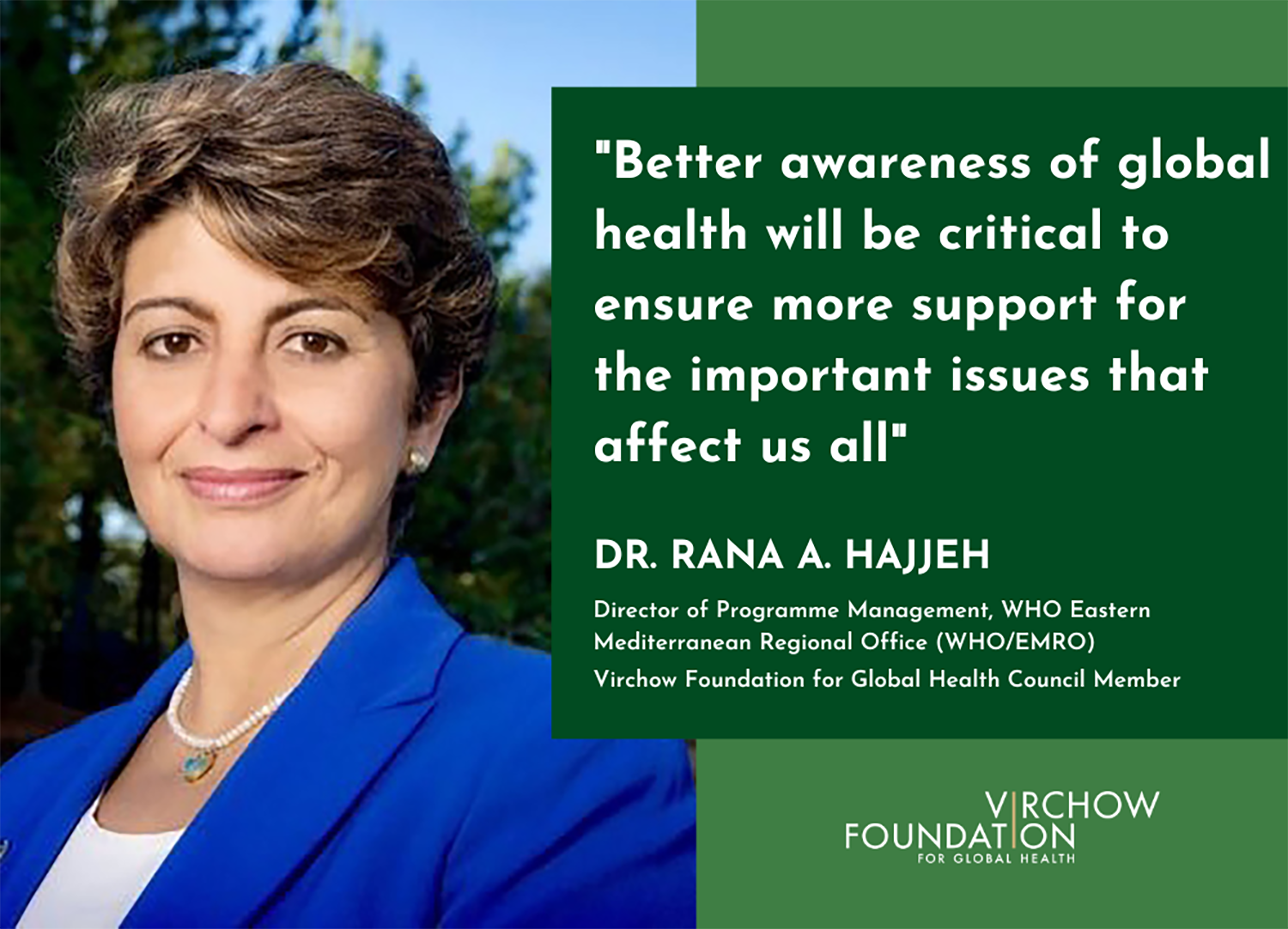
Dr Hajjeh is a senior public health leader with 25 years of experience in global health, health policy and diplomacy, and health management, especially in the Middle East Region. Since 2019, Dr Hajjeh serves as the Director of Programme Management at the World Health Organization Eastern Mediterranean Regional Office (WHO/EMRO). Prior to this role, she held the position of the Director of the Department of Communicable Diseases Prevention and Control. Prior to joining WHO/EMRO in 2016, Dr Hajjeh worked with the United States Centers for Disease Prevention and Control for 23 years. Dr Hajjeh is motivated to join the Council to bring more visibility to global health priorities.
From your perspective, why is engagement and awareness raising for global health important?
It is critical to get more commitment from all key stakeholders including governments, partners, people and communities. With Covid-19 in particular, but for many other important cross cutting public health issues, such as infectious diseases and environmental health, it has become very clear that “no one is safe until everyone is safe”. Better awareness of global health issues will be critical to ensure more support at all levels for the important issues that affect us all, more resources and capacity building, and more accountability.
How are you committed to engaging in global health topics within your current professional role and activities?
As part of my role as senior WHO official, and as overseeing all technical health issues in the region, I am responsible for ensuring we focus on implementing the many global health strategies, closely monitoring and seeing results at country level. I am also engaged in the development of many of these policies, supporting countries, and advocating for the importance of stronger global health systems and platforms.
How do you hope to achieve greater awareness and engagement for global health in your new role at the Virchow Foundation for Global Health? How can the Virchow Prize for Global Health help to increase awareness?
In my role with the foundation, I would like to bring more awareness of global health priorities from the WHO overall and especially regional perspectives, and a better sense of real challenges on the ground, as well as what is currently done and being achieved, so we don’t duplicate efforts. I think the Virchow prize will bring important visibility to global health and hopefully motivate further achievements in this area as well.
DR. CHIKWE IHEKWEAZU
Assistant Director-General
World Health Organization (WHO), Switzerland
DR. MARIAM JASHI
CEO, Global Sepsis Alliance
Secretary General, Medical Women’s International Association
PROF. DR. ILONA KICKBUSCH
Founding Director, Global Health Centre
Graduate Inst. of Intl and Development Studies Geneva
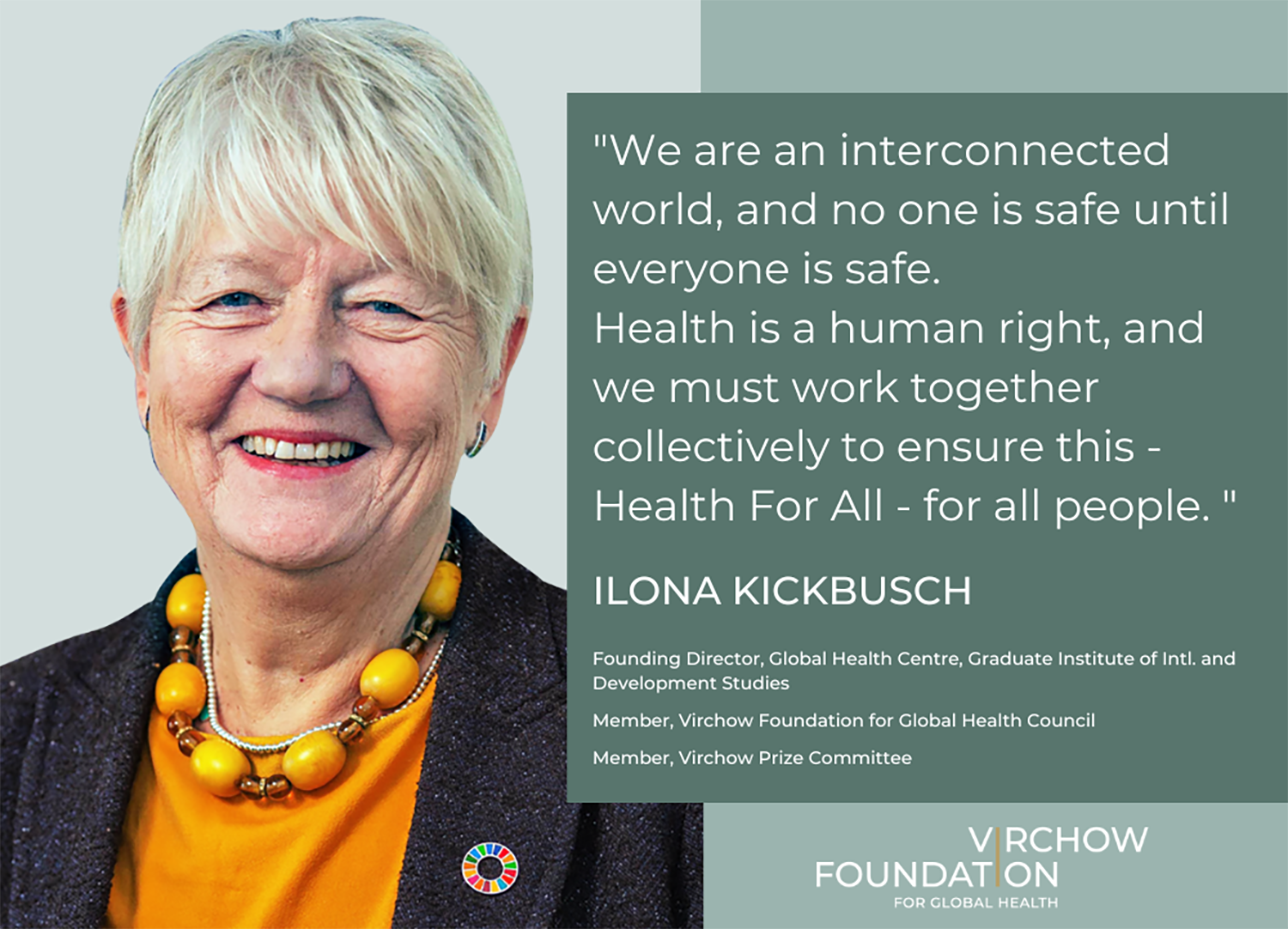
Ilona Kickbusch holds a master’s degree in Political Science and Sociology of the University of Konstanz. After completing her PhD she started her career at the European Office of the World Health Organization (WHO), holding several senior positions within the organisation until 1998 when she joined Yale University as . Professor and Director of the Division of Global Health at the Department of Epidemiology and Public Health until 2004. Professor Kickbusch is Founding Director of the Global Health Centre in the Graduate Institute of International and Development Studies in Geneva and a Senior Distinguished Fellow. She continues to advise the WHO. She also serves as Co-chair in the World Health Summit (WHS) Council. She is a member of the Global Preparedness Monitoring Board and serves on other distinguished boards and commissions. Read more on her role at the Virchow Foundation for Global Health.
From your perspective, why is engagement and awareness raising for global health important?
It is essential because we are and live in an interconnected world. The COVID-19 pandemic amplified that even further. The global community once more realised that “no one is safe until everyone is safe.”
Health is a human right, and we must work together collectively to ensure this – “Health For All” – for all people.
How are you committed to engaging in global health topics within your current professional role and activities?<
Ever since I started my academic and professional career, I am passionate about and committed to the global health landscape. All my work is therefore connected to it, pushing for accelerated action to reach health equity driven by human rights. Of particular relevance to this is probably my work with the World Health Organization (WHO) and the World Health Summit, further raising awareness for the determinants of health and global health.
How do you hope to achieve greater awareness and engagement for global health in your new role at the Virchow Foundation for Global Health? How can the Virchow Prize for Global Health help to increase awareness?
Reflecting on the decade of working together with Detlev Ganten, Co-Founder of the Virchow Foundation for Global Health, it is truly amazing to see the idea of this Prize come to life. I am proud to have been an active contributor from the beginning and am very happy to see it come to fruition. The Virchow Prize for Global Health itself, but even more so the laureate and her or his work, will be able to make global health tangible for many more people.
PROF. DR. ELIZABETH MACINTYRE
President, Biomedical Alliance in Europe
Board Member, European Haematology Association (EHA)

In 1980, Elizabeth Macintyre graduated in Medicine from the Newcastle-Upon-Tyne University in the United Kingdom, where she also trained in internal medice. She then specialised in clinical/laboratory haematology at University College London, obtained her PhD at St. Louis Hospital in Paris, France and completed her postdoctoral period at Harvard University. Since 1992, she has been a professor in Diagnostic Haematology at the Université Paris Cité and Necker-Enfants-Malades Hospital, where she also co-directs an INSERM/CNRS research team on normal and pathological lymphoid development at the Institut Necker-Enfants-Malades (INEM). Professor Macintyre currently serves as President of the European Hematology Association (EHA) and is President-Elect of the Biomedical Alliance in Europe.
Read more on why she joined the Virchow Foundation for Global Health Council and what she hopes to achieve in her new role.
From your perspective, why is engagement and awareness raising for global health important?
“Health is not everything, but without health, everything is nothing.” As a (medical) health care professional, I would like to see greater emphasis on our teaching in medical schools and during post-graduate training on health rather than disease-oriented care.
How are you committed to engaging in global health topics within your current professional role and activities?
By creating a global health initiative in our new Université Paris Cité (born of the fusion of Paris Descartes, Paris Diderot and Institut Physique du Globe et de la Planète and now closely allied to Institute Pasteur), in conjunction with our Circle U. European University Alliance, we are developing an emphasis on prevention. Within the Biomedical Alliance in Europe, we plan to increase awareness of global and one health issues in our over 35 member societies.
How do you hope to achieve greater awareness and engagement for global health in your new role at the Virchow Foundation for Global Health? How can the Virchow Prize for Global Health help to increase awareness?
This is a European structure, born as we benefit from the dynamics set-off by the pandemic, with the wide-spread desire to create a European Health space. Now is the time to get this right. The potential of the Virchow Prize for Global Health to show the world that Europe thinks globally and can act collectively is enormous.
BENOÎT MIRIBEL
Secretary General
One Sustainable Health Forum, France
DR. MATSHIDISO MOETI
WHO Regional Director for Africa
World Health Organization (WHO), DRC
DR. ANDERS NORDSTRÖM
Advisor Global Health
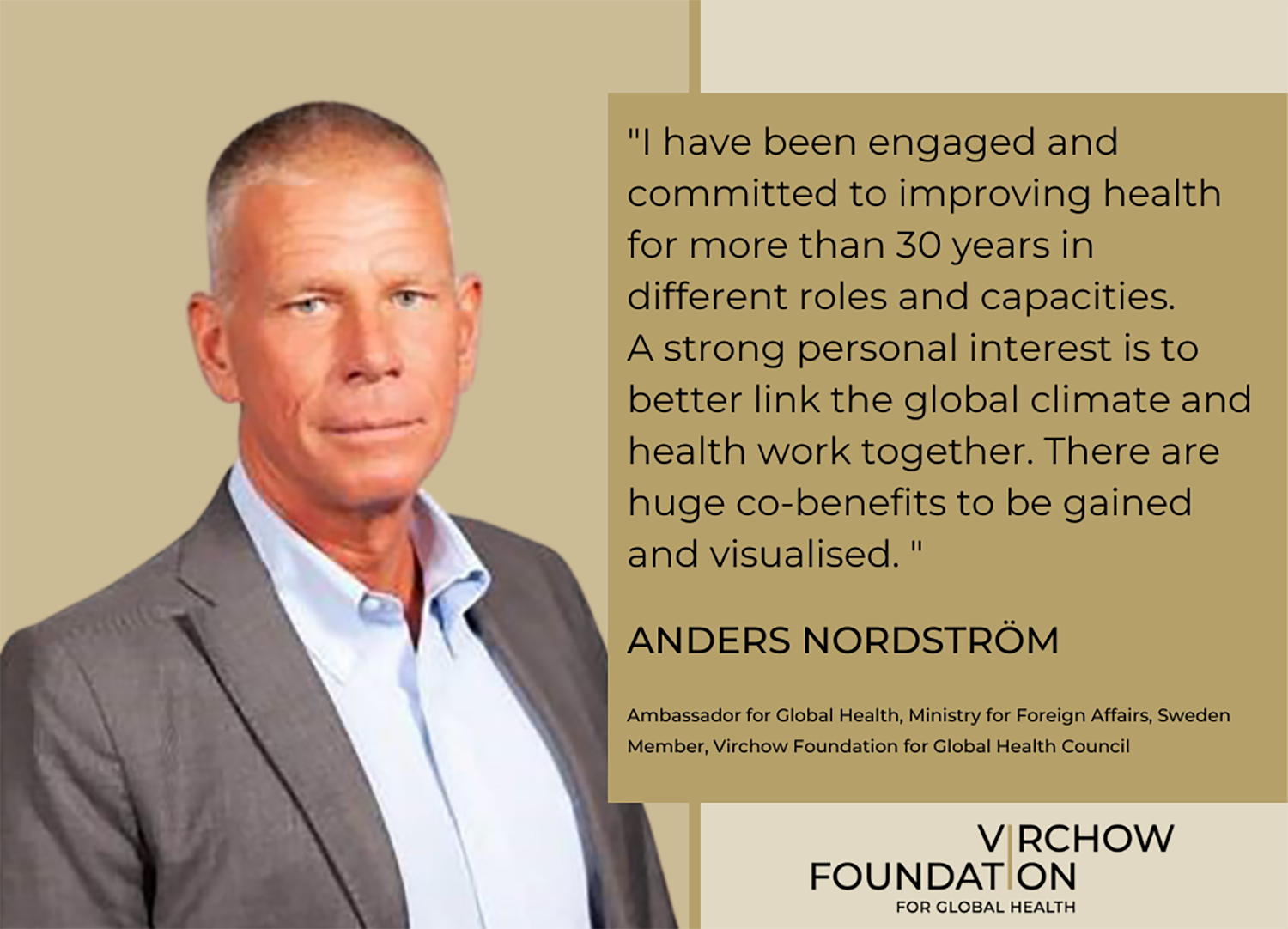
A trained physician at the Karolinska Institutet in the field of national and international health policy, planning and strategic leadership, Anders Nordström holds the position as Ambassador for Global Health at the Swedish Ministry for Foreign Affairs since September 2010. Dr Nordström served as Assistant Director-General and acting Director-General for the World Health Organization (WHO) as well as the Head of the WHO Country Office in Sierra Leone. He is a member of the Commission for Universal Health convened by Chatham House. Anders Nordström’s motivation to join the Virchow Foundation for Global Health is to further engage the dialogue around key global health issues. Read more on his role within the Foundation and his engagement for global health in his capacity as an Ambassador.
From your perspective, why is engagement and awareness raising for global health important?
The factors of highest importance to people’s health are increasingly related to global and regional trends and transitions. Action needs to happen locally, but global cooperation is needed to address some of the challenges. A pandemic treaty is one example. Another is to reduce the use of fossil fuel and air pollution through the continued climate negotiations. A third example is innovation and research. Health is also an issue that connects and brings people together across the world.
How are you committed to engaging in global health topics within your current professional role and activities?
I have been engaged and committed to improving health for more than 30 years in different roles and capacities. A key priority right now is to ensure that Sweden, through our EU Council Presidency, advances the EU institutions and member states contribution to global health. A strong personal interest is to link the global climate and health work better together. There are huge co-benefits to be gained and visualised.
How do you hope to achieve greater awareness and engagement for global health in your new role at the Virchow Foundation for Global Health? How can the Virchow Prize for Global Health help to increase awareness?
The fact that the Virchow Prize for Global Health is focusing on public health and not merely the medical aspect of health is important. The Prize can contribute to a better understanding of that. The group of people engaged in the advisory council are great global health leaders with extensive networks and can be instrumental in the dialogue around key global health issues. The Virchow Prize for Global Health can serve as a platform.
PROF. DR. TOLULLAH ONI
Director, Global Diet and Physical Activity Group
University of Cambridge
PROF. DR. NICOLE REDVERS
Associate Professor, University of Western Ontario | Western Research Chair & Director, Indigenous Planetary Health
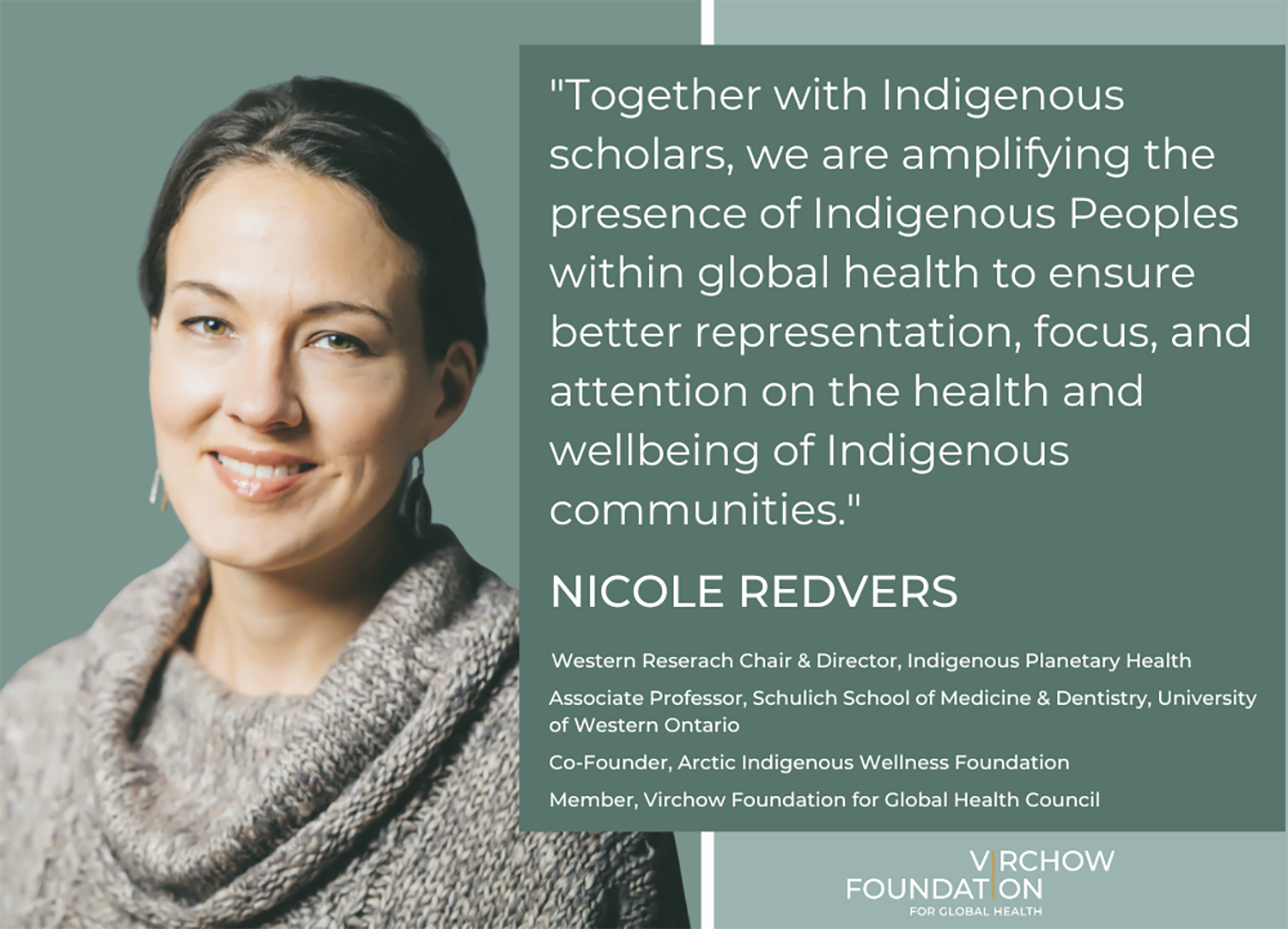
Dr. Nicole Redvers, ND, MPH, is a member of the Deninu K’ue First Nation (Northwest Territories, Canada), and is an Associate Professor, Western Research Chair, and Director of Indigenous Planetary Health at the Schulich School of Medicine & Dentistry at the University of Western Ontario. Dr. Redvers has had previous appointments in both the Department of Family & Community Medicine and the Department of Indigenous Health at the University of North Dakota where she helped co-develop the first Indigenous Health PhD degree program in North America. She has been actively involved at regional, national, and international levels promoting the inclusion of Indigenous perspectives in both human and planetary health research and practice. Dr. Redvers sits on the Canada Research Coordinating Committees’ Indigenous Leadership Circle in Research, is a commissioner on the Lancet Commission on Arctic Health, sits on the steering committee for the Planetary Health Alliance based out of Harvard, and is co-chair of the Planetary and Global Health committee with the Association of Faculties of Medicine of Canada. Her scholarly work engages a breadth of scholarly projects attempting to bridge gaps between Indigenous and Western ways of knowing as it pertains to individual, community, and planetary health. Dr. Redvers is the author of the trade paperback book titled, ‘The Science of the Sacred: Bridging Global Indigenous Medicine Systems and Modern Scientific Principles’. Dr. Redvers is actively engaged in and has dedicated her academic career to promoting the inclusion of Indigenous perspectives in planetary health and education for sustainable healthcare (ESH) internationally.
Read more on her extensive professional and academic experience working with Indigenous patients, scholars, and communities around the globe and her motivation to join the Virchow Foundation Council.
From your perspective, why is engagement and awareness raising for global health important?
Our most pressing global health crises requires collaborations across varying scales of influence and the inclusion and belonging of multiple worldviews and experiences. Whether or not it is the health impacts of climate change or pandemics, a global health response will be required for successful mobilisation and achievement of health equity for all on the planet.
How are you committed to engaging in global health topics within your current professional role and activities?
Indigenous global health has been an often-minimised component of global health discourse and practice. Together with Indigenous scholars across the globe, we are amplifying the presence of Indigenous People within global health spaces to ensure better representation, focus, and attention on the health and wellbeing of Indigenous communities around the globe.
How do you hope to achieve greater awareness and engagement for global health in your new role at the Virchow Foundation for Global Health? How can the Virchow Prize for Global Health help to increase awareness?
The Virchow Foundation for Global Health is strategically located to bring together the diverse voices required to ensure the broadest platform for global health advocacy efforts. I look forward to amplifying the important global health narratives coming from on the ground community work while also supporting the movement building that the Virchow Prize for Global Health will enable.
President
European School of Management and Technology (ESMT) Berlin
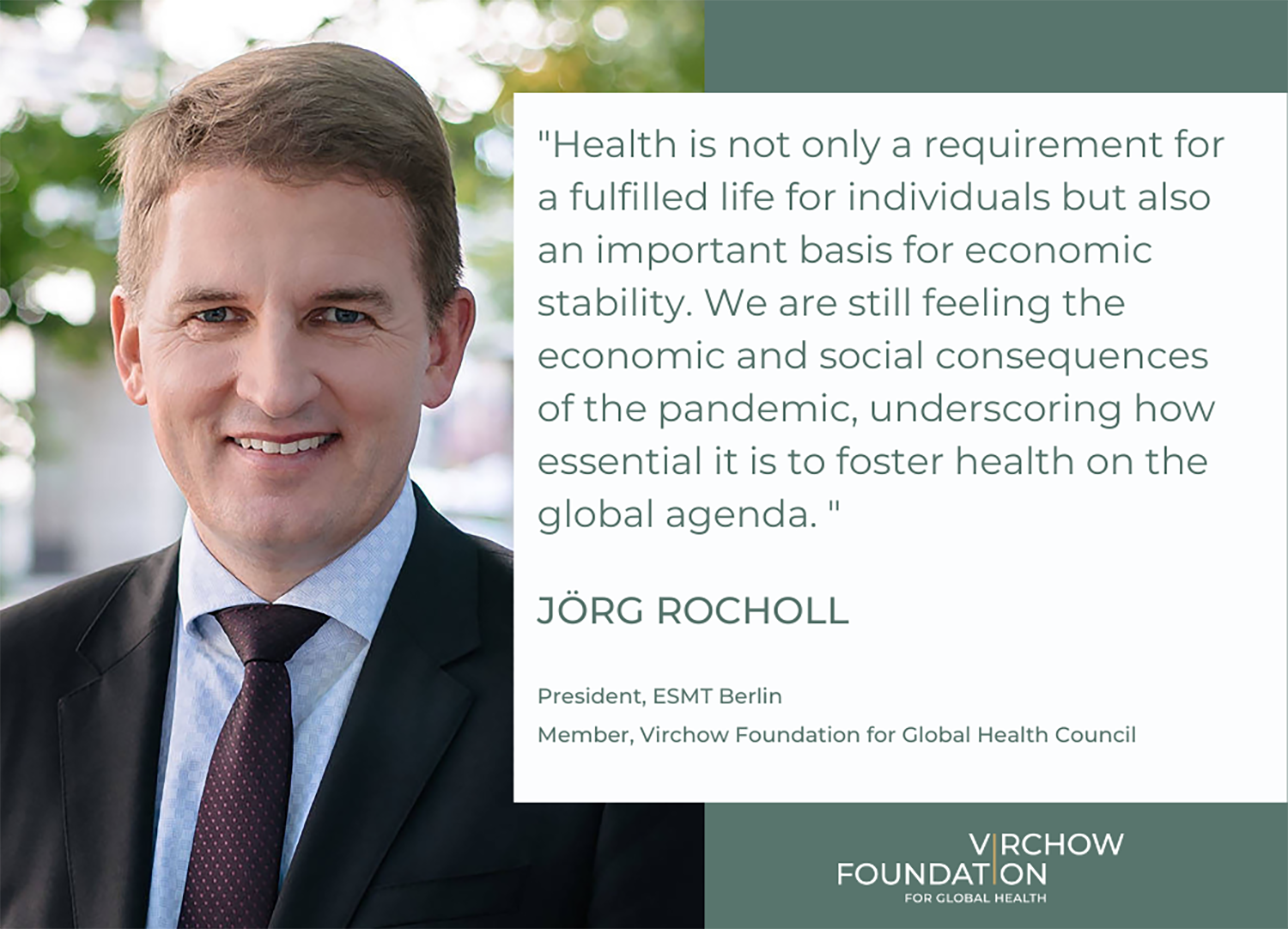
Jörg Rocholl holds a PhD in finance and economics and a MPhil from the Columbia Business School in New York as well as a degree in economics (with honours) from the Witten/Herdecke University. His research interests include corporate finance, corporate governance, financial intermediation, central banks and financial regulation. Professor Rocholl joined the ESMT in 2007 and was appointed president in 2011. Jörg Rocholl is chair of the advisory board to the German Federal Ministry of Finance and holds the Deutsche Bank professorship in Sustainable Finance as of at ESMT as of September 2022.
Professor Rocholl has demonstrated his commitment to keeping global health on the agenda by joining the Virchow Foundation for Global Health Council.
From your perspective, why is engagement and awareness raising for global health important?
Health is not only a requirement for a fulfilled life for individuals but also builds an important basis for economic development and stability. In an interconnected global world, the impact of health is amplified even further, something we all experienced directly during the COVID-19 pandemic. Around the world, we are still feeling its economic and social consequences underscoring how essential it is to foster health on the global agenda.
How are you committed to engaging in global health topics within your current professional role and activities?
In the summer of 2022, we founded DEEP – Institute for Deep Tech Innovation at ESMT Berlin. The institute focuses on promoting innovation and startups founded on cutting-edge technologies, such as artificial intelligence (AI), new materials, and biotechnology. DEEP is also home to the Creative Destruction Lab (CDL) Berlin, an internationally recognised accelerator for science and technology-based early-stage startups. The first stream at CDL Berlin is health. The goal is to foster applied, scientific, and technological innovations that improve human health and well-being. This includes digital health, medical devices, diagnostics, bioinformatics, genomics, and biotechnologies such as therapeutics and synthetic biology.
How do you hope to achieve greater awareness and engagement for global health in your new role at the Virchow Foundation for Global Health? How can the Virchow Prize for Global Health help to increase awareness?
As a Member of the Virchow Foundation for Global Health Council, I am deeply committed to helping ensure that health stays on the agenda and is closely aligned with the United Nations Agenda 2030 Sustainable Development Goals (SDGs). The Virchow Prize for Global Health honours and recognises those who work so tirelessly to promote, challenge, and advance global health through significant innovation. This generous Prize can help inspiring others to contribute to constantly improving global health.
Chief Executive Officer
Wellcome Trust
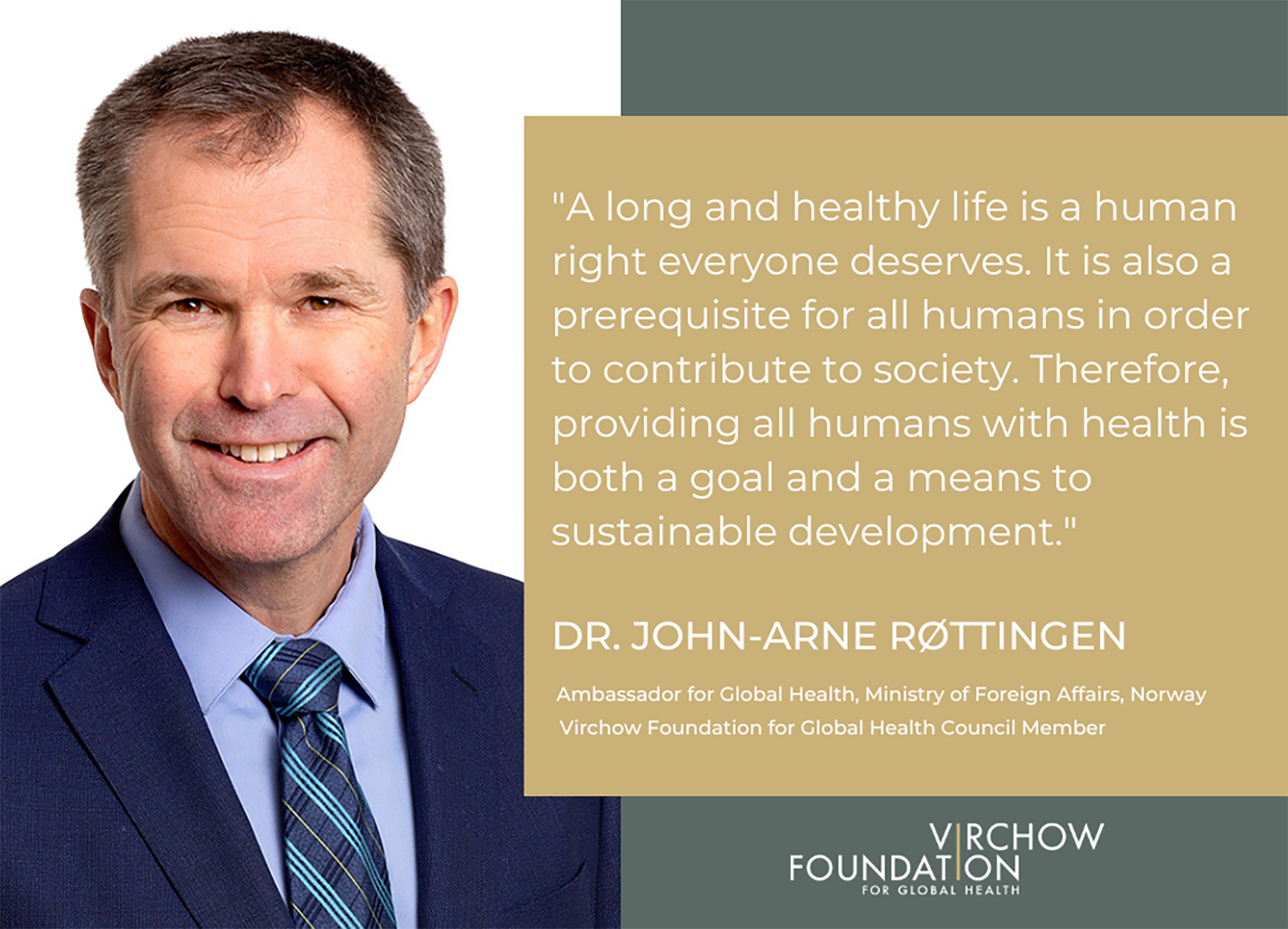
Dr. John-Arne Røttingen, MD, PhD, MSc, MPA, is currently Ambassador for Global Health at the Ministry of Foreign Affairs of Norway. He received his MD and PhD from the University of Oslo, an MSc from Oxford University and an MPA from Harvard, where he is adjunct professor at the Department of Global Health and Population at Harvard T.H. Chan School of Public Health. In addition, he is Adjunct Scientific Director at the Norwegian Institute of Public Health and Visiting Fellow of Practice at Blavatnik School of Government, Oxford University, and was the founding interim Chief Executive Officer of CEPI (Coalition for Epidemic Preparedness Innovations). Prior to his role in the Ministry of Foreign Affairs, he was the Chief Executive of the Research Council of Norway; Executive Director of Infection Control and Environmental Health at the Norwegian Institute of Public Health; Professor of Health Policy at the Department of Health Management and Health Economics, Institute of Health and Society, University of Oslo. He has been the founding Chief Executive of the Norwegian Knowledge Centre for Health Services; Oxford Scholar at Wadham College; Fulbright Fellow at Harvard Kennedy School; Chair of the Board of the Alliance for Health Policy and Systems Research; and Chair of the Consultative Expert Working Group on Research and Development: Financing and Coordination (CEWG), WHO (World Health Organization). As a member of the Virchow Foundation Council, Ambassador Røttingen is motivated to help contribute to a broader visibility and understanding of global health amongst the public.
From your perspective, why is engagement and awareness raising for global health important?
All humans deserve a long and healthy life. This is a human right, and it is also a prerequisite for individuals to being able to work and contribute to society. Healthy lives are therefore both a goal and a means to sustainable development.
How are you committed to engaging in global health topics within your current professional role and activities?
As an ambassador for Global Health of Norway my role is to support the Norwegian government in continuing strong contributions to Global Health. We are aiming to achieve this with our investments in multilateral health efforts, as well as with contributions to our collective international system, norms, and regulations so they are better fit for purpose.
How do you hope to achieve greater awareness and engagement for global health in your new role at the Virchow Foundation for Global Health? How can the Virchow Prize for Global Health help to increase awareness?
The Virchow Prize for Global Health provides a wonderful opportunity for rewarding important innovations and contributions to Global Health. Honouring such efforts will also contribute to a broader visibility and understanding in society and public of the immense importance of working to improve Global Health for all.
PROF. DR. LUCIANO SASO
Former Deputy Rector | Professor of the Faculty of Pharmacy and Medicine
Sapienza University of Rome
DR. BERNHARD SCHWARTLÄNDER
Global Health Envoy
Embassy of the Federal Republic of Germany, Beijing
PROF. DR. GEORG SEIFERT
Paediatrician, Specialized in paediatric oncology and haematology
Charité – Universitätsmedizin Berlin
PROF. DR. AMIRHOSSEIN TAKIAN
Vice Dean, School of Public Health
Tehran University of Medical Sciences

Professor Amirhossein Takian graduated from Shahed Medical University and received his PhD in Health Policy & Health Services Research from the London School of Hygiene & Tropical Medicine (LSHTM) in 2009. Amirhossein Takian then completed his postdoctoral fellowship in Health Sector Reform Evaluation at the University College London. Since August 2020, he holds a professorship in Health Policy & Global Health at the School of Public Health of the Tehran University of Medical Sciences.
Currently, Professor Dr. Amirhossein Takian is Head of the Department of Global Health & Public Policy, as well as Vice Dean of the School of Public Health of the Tehran University of Medical Sciences. By joining the Council of the Virchow Foundation for Global Health, he hopes to continuously spur recognition and engagement for global health.
From your perspective, why is engagement and awareness raising for global health important?
People empowerment is the key to improving health and well-being of global citizens. With the increasing burden of noncommunicable diseases (NCDs) and other chronic conditions, and the “global village” we all live in, people need to take social responsibility to stay healthy and contribute to their societies.
How are you committed to engaging in global health topics within your current professional role and activities?
I have three hats in this regard. As an academic, I have established the only department of global health in the pioneer university of my country. In this role, I am engaging with global scholars to improve knowledge, train global health professionals, and answer key global health questions in Iran and our region. As a policy maker, I have been trying my best to use good evidence to inform reliable and feasible policies, for sustainable health development. As an advocate, my passion and goal is creating a reasonable environment for good governance in global health, through addressing conflict of interests, increasing public awareness as well as enhancing transparency and responsiveness.
How do you hope to achieve greater awareness and engagement for global health in your new role at the Virchow Foundation for Global Health? How can the Virchow Prize for Global Health help to increase awareness?
Through identification of key global health challenges, recognition of main contributions to address them, engagement with an inclusive and comprehensive group of scholars from various settings (low-, middle-, and high-income countries), and partial allocation of the Virchow Prize for Global Health to practice and investment in global health. The Prize can serve as a product [and have an] impact [in increasing engagement], [more so] than a [single] person. [Laureates] need to be determined with careful consideration and good consensus from key Members of the Virchow Prize Committee.
PROF. DR. LOTHAR H. WIELER
Head of the Chair, Professor for Digital Global Public Health
Hasso-Plattner-Institute (HPI)
GUESTS OF THE COUNCIL
PROF. DR. EUGENIO GAUDIO
International President, World Health Summit 2022 | President, Rome Sapienza Foundation
PROF. DR. ADNAN HYDER
International President, World Health Summit 2023 | Professor, The George Washington University
HON. MICHEL SIDIBÉ
Special Envoy for the Africa Medicine Agency (AMA)
African Union (AU)
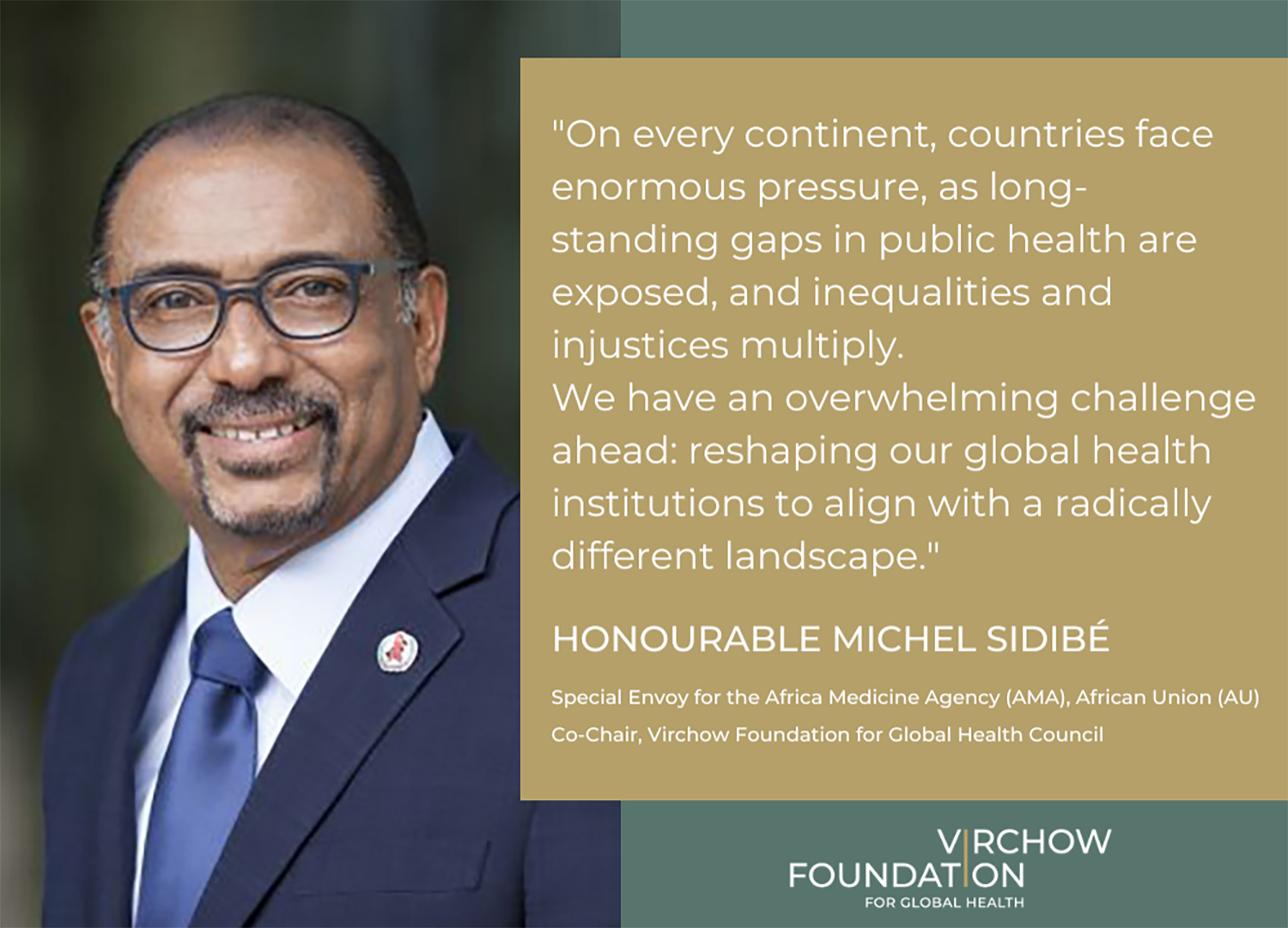
Michel Sidibé has championed a people-centred approach to health and development for over 40 years. He is a renowned tireless champion of African-owned solutions and has been an outspoken advocate for local pharmaceutical production of medicines and other essential health commodities. Honourable Sidibé significantly contributed to the efforts towards access to quality and safe medicines and vaccines and in fighting global inequities. In April 2021, Michel Sidibé was appointed African Union Special Envoy for the Africa Medicine Agency (AMA). Thanks to his high-level advocacy efforts, the treaty entered into force more promptly than expected on November 5, 2021. From 2009-2019, he served as Executive Director of UNAIDS, holding the rank of Under-Secretary-General of the United Nations. Prior to joining UNAIDS, Honourable Michel Sidibé worked at UNICEF and for Terre des Hommes, where his passion for advancing global health and social justice began. Under his leadership at UNAIDS, more than 25 million people started life saving HIV treatment. A former Minister of Health and Social Affairs for Mali from 2019-2020, Sidibé has promoted health as an entry point for peace and security building. In 2021 he was appointed a board member of The Global Commission on Drug Policy. An economist by training, Michel Hamala Sidibé is the recipient of various African and global awards, including honorary doctorates from world’s leading universities. From 2009-2019, he served as Executive Director of UNAIDS, holding the rank of Under-Secretary-General of the United Nations. Prior to joining UNAIDS, Honourable Michel Sidibé worked at UNICEF and for Terre des Hommes, where his passion for advancing global health and social justice began. Under his leadership at UNAIDS, more than 25 million people started life saving HIV treatment. A former Minister of Health and Social Affairs for Mali from 2019-2020, Sidibé has promoted health as an entry point for peace and security building. In 2021 he was appointed a board member of The Global Commission on Drug Policy.
From your perspective, why is engagement and awareness raising for global health important?
Our human planet is facing an unprecedented global health crisis that has spread suffering and disrupted the lives of hundreds of millions of people. On every continent, countries face enormous pressure, as long-standing gaps in public health are exposed, and inequalities and injustices multiply. We have an overwhelming challenge ahead: reshaping our global health institutions to align with a radically different landscape.
We are in a defining moment in Africa!
COVID-19 has highlighted the need for stronger manufacturing capacity in Africa, paired with reliable procurement of locally manufactured products. From the onset of the pandemic, limited local supply of diagnostics, drugs, vaccines, and other products has caused delays in access across the continent. Africa has to be part of the on-going conversations on the need to building a more robust international health architecture that will protect future generations.
Africa, especially, has a difficult fight!
Long-term economic development has been constantly undermined by poor health systems and a high level of disease. Just 2% of the world’s doctors live in Sub-Saharan Africa. And many of the countries in the continent have just one doctor for up to 40,000 people, and five or fewer intensive care beds per 100,000 people. Health spending can reach up to 40% of household income in some African countries. Investments in health is key – there is need for building new solutions – from infrastructure to capacity development and building new health workforce to building digital health and telemedicine to new financial tools including health insurance to make this viable. Our main challenge is to generate and harness the much-needed political attention to health, as a priority for the continent’s long-term prosperity.
How are you committed to engaging in global health topics within your current professional role and activities?
The level of dependence on externally manufactured goods is problematic, as access to COVID-19 vaccines has reminded Africans. Local manufacturing of pharmaceuticals in the continent is, therefore, no longer an option. In fact, the continent produces only 3% of the medicines consumed by its people. Pharmaceutical supply chains have multiple intermediaries, contributing to the fact that drugs sold in Sub- Saharan Africa are often the most expensive in the world. In addition, Africa has the highest prevalence of substandard and falsified medicines (30%). These challenges have largely been attributed to weak or absent drug regulatory systems, with unclear policies and incomplete or inconsistent legal and regulatory frameworks. Acting at this level is therefore critically important. Africa´s leaders have made development of the pharmaceutical industry a key priority, as enshrined in the African Union´s Vision 2063, ‘The Africa We Want’. Increasing the local manufacturing of vaccine, medicines and therapeutics requires partnerships between governments and companies for additional investments in science, technology, and innovation to improve health, spur economic growth, and reduce poverty across the continent. As African Union Special Envoy for the establishment of the African Medicine Agency, I am strongly committed to continue advocating for three transformative actions:
- Establish protective regulatory context for developing Hubs of Excellence for the production of vaccines, medicines and therapeutics
- Africanize Research and Development while galvanizing innovation and transfer of technology
- Mutualize competencies and think in terms of economies of scale.
How do you hope to achieve greater awareness and engagement for global health in your new role at the Virchow Foundation for Global Health? How can the Virchow Prize for Global Health help to increase awareness?
I am privileged to serve as Co-Chair of the of the Virchow Foundation for Global Health Council. The Foundation offers a unique platform to advocate for a transformative global agenda grounded in health equity and social justice, powerful scientific and medical tools, partnerships with governments, scientists, international organisations and civil society, and programmes that work to advance global health. I am convinced that the prestigious Virchow Prize for Global Health will contribute significantly to raising awareness and incentivising innovation to address critical public health challenges that Africa and the world are facing. I look forward to working with the other eminent members of the Council on this exciting endeavour.
Note: The members of the Virchow Foundation for Global Health Council will be presented in detail on step by step – please click the “more” button – and also through our newsletter and at the news section of this website, furthermore via social media posts. Thus, from time to time please revisit our website.
